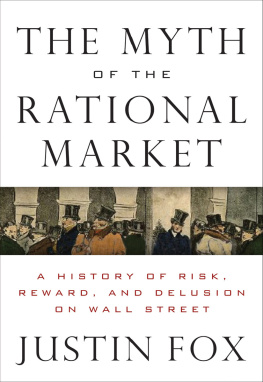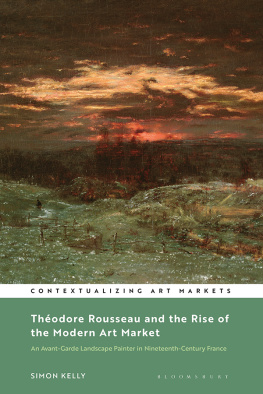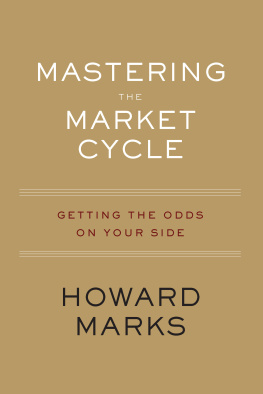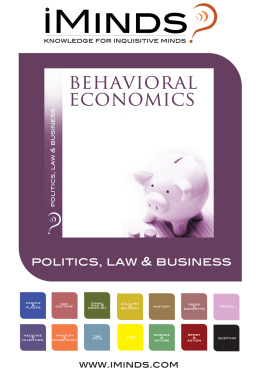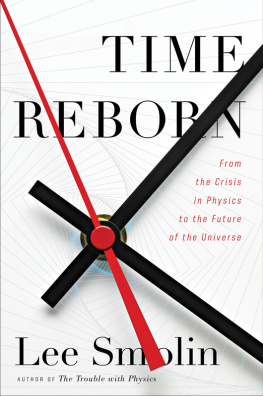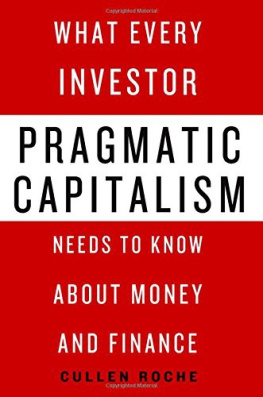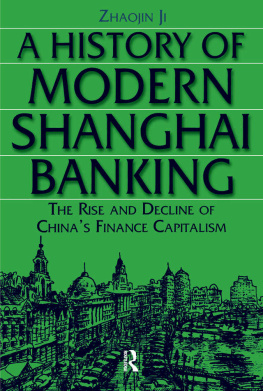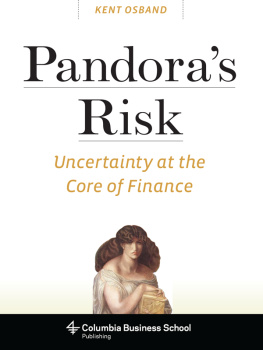Contents
It had been Working So Exceptionally Well
Irving Fisher Loses his Briefcase, and Then his Fortune
The first serious try to impose reason and science upon the market comes in the early decades of the twentieth century. It doesnt work out so well.
A Random Walk from Fred Macaulay to Holbrook Working
Statistics and mathematics begin to find their way into the economic mainstream in the 1930s, setting the stage for big changes to come.
Harry Markowitz Brings Statistical Man to the Stock Market
The modern quantitative approach to investing is assembled out of equal parts poker strategy and World War II gunnery experience.
A Random Walk from Paul Samuelson to Paul Samuelson
The proposition that stock movements are mostly unpredictable goes from intellectual curiosity to centerpiece of an academic movement.
Modigliani and Miller Arrive at a Simplifying Assumption
Finance, the business school version of economics, is transformed from a field of empirical research and rules of thumb to one ruled by theory.
Gene Fama Makes the Best Proposition in Economics
At the University of Chicagos Business School in the 1960s, the argument that the market is hard to outsmart grows into a conviction that it is perfect.
Jack Bogle Takes on the Performance Cult (and Wins)
The lesson that maybe its not even worth trying to beat the market makes its circuitous way into the investment business.
Fischer Black Chooses to Focus on the Probable
Finance scholars figure out some ways to measure and control risk. More important, they figure out how to get paid for doing so.
Michael Jensen Gets Corporations to Obey the Market
The efficient market meets corporate America. Hostile takeovers and lots of talk about shareholder value ensue.
Dick Thaler Gives Economic Man a Personality
Human nature begins to find its way back into economics in the 1970s, and economists begin to study how markets sometimes fail.
Bob Shiller Points Out the Most Remarkable Error
Some troublemaking young economists demonstrate that convincing evidence for financial market rationality is sadly lacking.
Beating the Market With Warren Buffett and Ed Thorp
Just because professional investors as a group cant reliably outperform the market doesnt mean that some professional investors cant.
Alan Greenspan Stops a Random Plunge Down Wall Street
The crash of 1987 exposes big flaws in the rational finance view of risk. But a rescue by the Federal Reserve averts a full reexamination.
Andrei Shleifer Moves Beyond Rabbi Economics
The efficient markets critics triumph by showing why irrational market forces can sometimes be just as pervasive as the rational ones.
Mike Jensen Changes his Mind About the Corporation
The argument that financial markets should always set the prioritiesfor corporations and for societyloses its most important champion.
Gene Fama and Dick Thaler Knock Each Other Out
Where has the debate over market rationality ended up? In something more than a draw and less than a resounding victory.
The Anatomy of a Financial Crisis
IT HAD BEEN WORKING SO EXCEPTIONALLY WELL
O N THE FOURTH T HURSDAY OF October in 2008, eighty-two-year-old Alan Greenspan paid a visit to Capitol Hill to admit that he had misunderstood how the world works. Sitting at the witnesses table in the hearing room on the first floor of the Rayburn House Office Building, the former Federal Reserve chairman started by reading a statement that tried to explain what had gone so wrong with financial markets over the past year. After asking Greenspan a few questions, the chairman of the House Committee on Government Oversight and Reform, California Democrat Henry Waxman, summed up. In other words, he said, you found that your view of the world, your ideology, was not right. It was not working.
Precisely, replied Greenspan. Thats precisely the reason I was shocked, because I had been going for forty years or more with very considerable evidence that it was working exceptionally well.1
During those forty yearsespecially the nineteen during which Greenspan was the worlds top central bankerfinancial markets grew to play an ever-larger and less-fettered role. The stock market boomed for most of Greenspans years at the Fed. Bond markets boomed too, and expanded into new territory as Wall Street whizzes took mortgage loans and auto loans and credit card debt off the balance sheets of banks and repackaged them into asset-backed securities sold to investors around the world. The most dizzying growth came in over-the-counter derivatives, custom-made financial instruments (options, futures, swaps) that tracked the movements of other financial instruments. With them, traders could insure against or bet on moves in currencies or interest rates or stocks. In recent years it had even become possible to use derivatives to insure against loans gone bad. From 1987 to 2007, the face value of over-the-counter derivatives rose from $866 billion to $454 trillion.2
As Fed chairman, Greenspan had celebrated this financialization of the global economy. These instruments enhance the ability to differentiate risk and allocate it to those investors most able and willing to take it,3 he said in 1999, referring to derivatives in particular. Greenspan had once expressed the worry, in 1996, that stock markets might be losing themselves in a frenzy of irrational exuberance. When they kept rising after that, he took the lesson that the market knew more than he did.
This was Greenspans ideologyand it had been widely shared in Washington and on Wall Street. Financial markets knew best. They moved capital from those who had it to those who needed it. They spread risk. They gathered and dispersed information. They regulated global economic affairs with a swiftness and decisiveness that governments couldnt match.
A ND THEN, SUDDENLY, THEY DIDNT. The whole intellectual edifice collapsed in the summer of last year, Greenspan admitted at the October 2008 hearing.4 That was when the private market for U.S. mortgage securities collapsed, beginning a fitful unraveling of asset market after asset market around the world. Distrust spread. Many previously thriving credit markets shut down entirely. Bank runslong thought to endanger only actual banksthreatened any financial institution that ran on borrowed money. After Greenspans successor at the Fed, Ben Bernanke, and Treasury Secretary Hank Paulson decided in September 2008 not to step in to avert such a run on Lehman Brothers, global finance virtually ceased functioning. It took a partial government takeover of the financial systemnot just in the United States but in Europeto bring back even a modicum of calm.
Greenspan struggled to explain what had gone wrong because the intellectual edifice around which he had built his thinking simply didnt allow room for the events of the preceding fourteen months. This was the edifice of rational market theory. The best-known element of rational market theory is the efficient market hypothesis, formulated at the University of Chicago in the 1960s with reference to the U.S stock market. The belief in the so-called rational market that took hold in the years that followed, though, was about more than just stocks. It held that as more stocks, bonds, options, futures, and other financial instruments were created and traded, they would inevitably bring more rationality to economic activity. Financial markets possessed a wisdom that individuals, companies, and governments did not.

